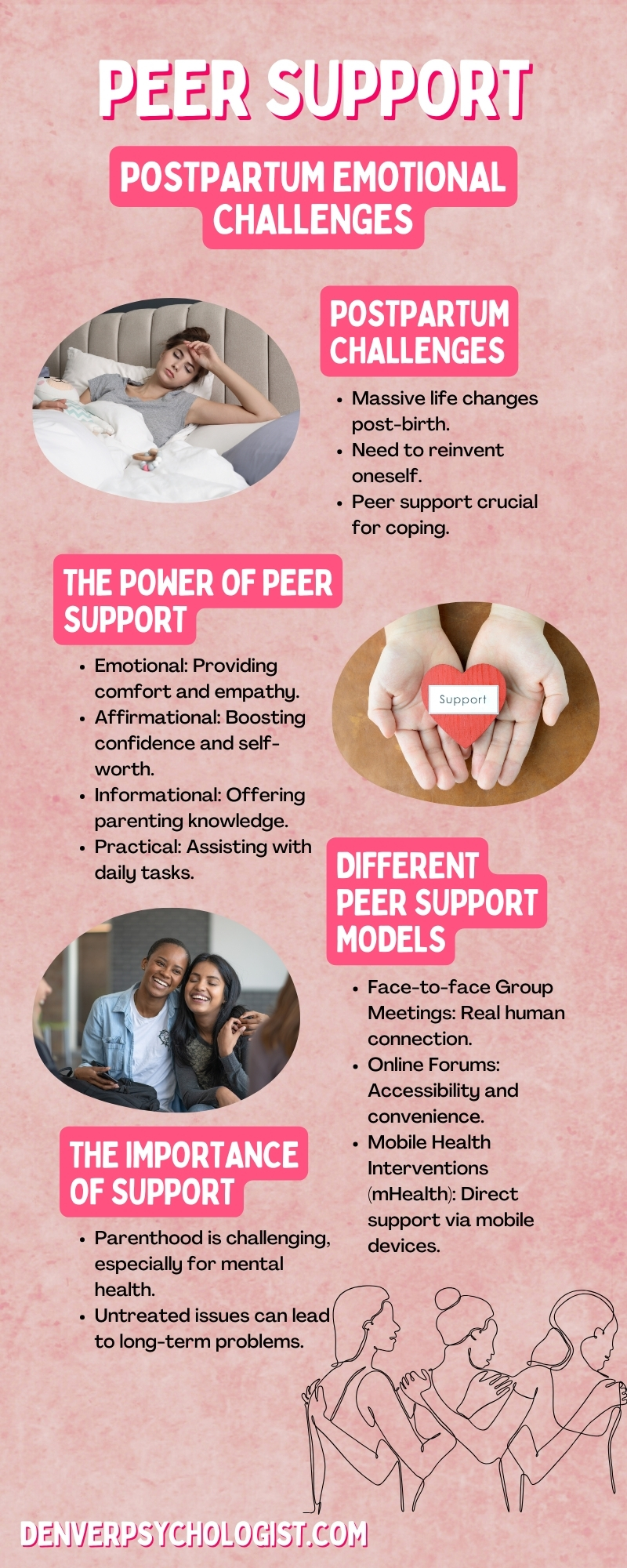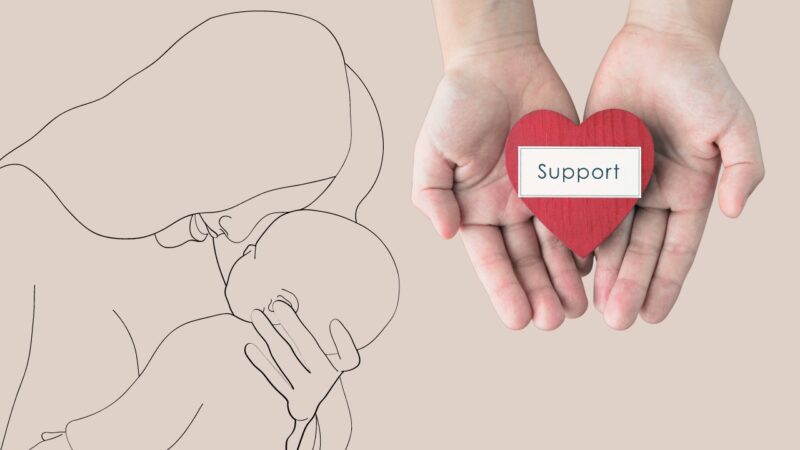I would draw a parallel between postpartum emotional challenges and labor. Sure this might be a strange thing to say, but it makes perfect sense.
Why?
After giving birth, women are faced with a massive change in their lives. They are not responsible only for themselves now. They have a little being near them that requires attention. So it is an absolute must to reinvent themselves as an individual.
Handling that responsibility is not the easiest thing for many. That is why peer support has a large role in overcoming the emotional challenges.
Let’s talk about it.

The Role of Peer Support

Peer support is a powerful asset in the arsenal against postpartum emotional challenges.
This type of support can be segmented into four primary categories:
- Emotional
- Affirmational
- Informational
- Practical
Each type plays a vital role in the recovery and empowerment of affected mothers. Emotional support offers a shoulder to lean on, affirmational support boosts self-worth and confidence, and informational support provides valuable knowledge about parenting.
Furthermore, it provides practical support in managing daily tasks that may overwhelm a new mother.
Research indicates that peer support significantly benefits mothers by reducing feelings of isolation, enhancing social networks, and increasing self-esteem and parenting competence.
For instance, a qualitative study in England involving interviews with 47 mothers identified two key benefits:
- The reduction of low mood and anxiety
- The overcoming of isolation
Mothers involved in peer support networks often report feeling empowered, less stressed, and more capable in their parenting roles, illustrating how critical such networks are in supporting maternal mental health.
Peer Support Models
Various models of peer support have been developed to meet the diverse needs of new mothers.
These include:
| Model of Peer Support | Key Benefit |
|---|---|
| Face-to-face Group Meetings | Enhances real human connection and emotional support. |
| Online Forums | Provides accessibility around the clock, accommodating various schedules and time zones. |
| Mobile Health Interventions | Offers high convenience with the ability to access support and resources directly from mobile devices. |
It goes without saying that each model offers unique benefits and challenges.
A good example of that has occurred during the COVID-19 pandemic:
Face-to-face peer support groups faced significant disruptions. During that period, 26% of mental health patients weren’t able to access the support, according to a report by The Lancet. It led to a rapid adaptation and increased reliance on online and mHealth platforms.
The role of mHealth has been particularly transformative, providing accessible and flexible support to mothers unable to participate in traditional settings due to:
- Logistical
- Health
- Personal reasons
Studies focusing on peer support with mobile health technologies show promising results, such as the knock-down of depressive scores and high satisfaction rates among participants.
The flexibility and accessibility of mHealth, combined with traditional peer support methods, enhance the scope and reach of these interventions, making them a crucial component in modern perinatal care strategies.
Effectiveness of Peer Support

The effectiveness of peer support in managing postpartum depression and anxiety has been documented with varying degrees of success across different studies.
The impact of peer support seems most pronounced in ethnic minority women and recent migrants, who may face additional barriers to accessing traditional healthcare services.
The heterogeneity in outcomes suggests that while peer support can be highly effective, its implementation must be carefully considered to match the specific needs and circumstances of different populations, enhancing both its reach and impact.
Challenges and Barriers to Effective Peer Support
Implementing peer support programs is not without its challenges. Logistical issues such as:
- Funding
- Training
- Sustainability
Cultural sensitivity and the reluctance of some individuals to participate pose barriers that need to be addressed to maximize the efficacy of these programs. Effective matching of peers is also critical, as it ensures that the support provided is relevant and empathetic to the mothers’ specific situations.
Is the Support Crucial?

The transition to parenthood is a challenging period, particularly concerning mental health. Statistically, between 9-21% of women experience significant episodes of depression and anxiety during this time.
These issues are exacerbated by sub-clinical symptoms like stress and low self-esteem, which are notably prevalent during pregnancy and early parenthood.
The risk factors increasing the vulnerability to these emotional challenges include:
- Lack of social support
- Low income
- Being a single parent
- Experiencing poor partner relationships
The consequences of untreated emotional disorders in the postpartum period are severe and far-reaching. For mothers, ongoing depression or anxiety can lead to long-term psychological conditions, including chronic depression.
This situation is compounded by hormonal changes, disrupted sleep patterns, and significant shifts in identity and family dynamics.
The data underscores a critical need for effective support mechanisms during this vulnerable period for both mother and child.
Research has shown promising results in addressing perinatal anxiety through interventions such as Mindfulness-Based Stress Reduction (MBSR), which could provide effective support mechanisms during this vulnerable period for both mother and child.
The Takeaway
Peer support is one of the tools that is about to change the way we see mental health treatment.
Surely, the issues that exist will need to be tackled to make this transition possible.

